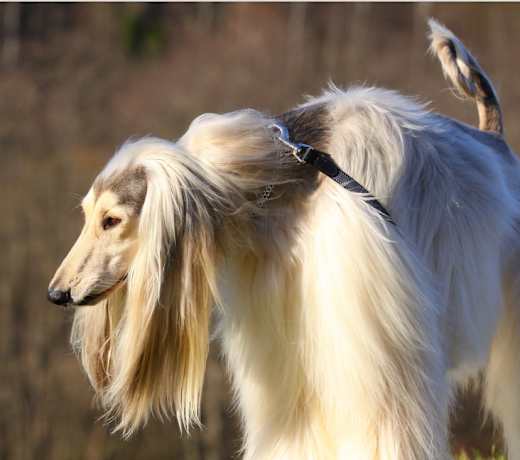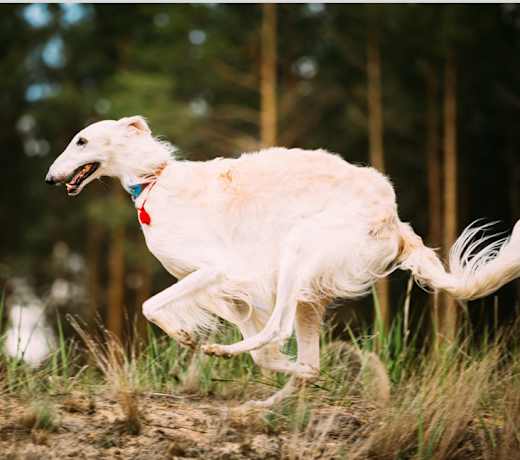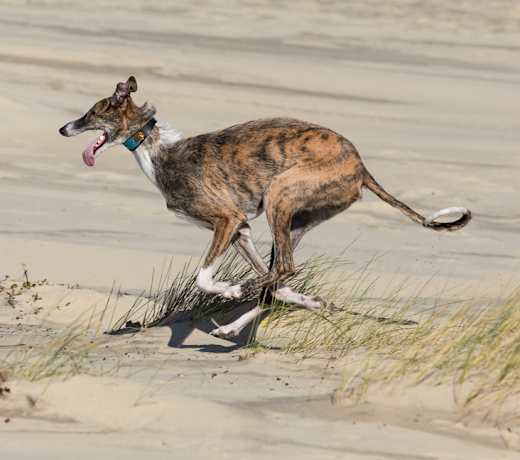Scottish Deerhounds stop growing at 18 to 24 months of age. They are slow to mature compared to some other breeds, with their growth extending over a longer period due to their large size. While they may achieve their full height earlier, they continue to fill out and develop muscle mass until they are about two years old.
Scottish Deerhound
Breed Type: Hound
Common nicknames: Deerhound
Coat: Wiry, double
Hypoallergenic: No, they will likely trigger allergies.
Temperament: Gentle, easygoing, affectionate, energetic
Life expectancy: 7-11 years
Color & patterns: Gray
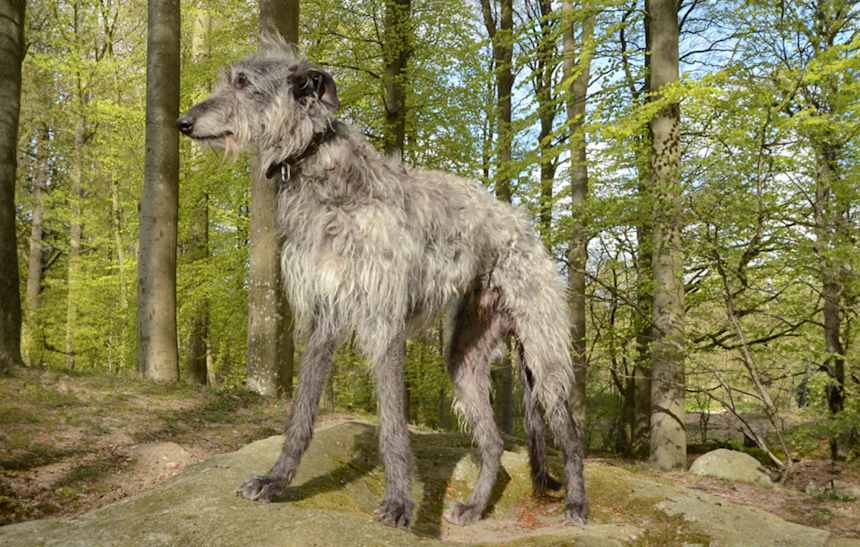
The Scottish Deerhound is a large breed known for their elegant and slender physique, gray color, and wiry coat. They share a similar build to the Greyhound and are renowned for their exceptional sight and speed — in fact, they’re one of the fastest breeds. Scottish Deerhounds are also known for their charming and mischievous personalities; they’re always ready to steal a treat or a heart with their irresistible antics. Their gentle and friendly nature makes them fantastic family companions, while their loyalty and protective instincts add a dash of heroism to their already larger-than-life presence. If you’re seeking a loyal pup, the Scottish Deerhound is the perfect choice.
Scottish Deerhound characteristics
Learn about about Scottish Deerhound basics like their fur colors, shedding levels, how much grooming they need, and other Scottish Deerhound facts.
Average height
28-30 inches (71.1-76.2cm)
Average weight
62-121 pounds (28.1-54.9 kg)
Average lifespan
7-11 years
Exercise needs
Grooming needs
Full-grown size
Good with cats
Good with kids
Training aptitude
How long do Scottish Deerhounds live?
Scottish Deerhounds live eight to 11 years on average. Due to their large size, they tend to have a shorter lifespan compared to smaller breeds. Regular veterinary care, a healthy diet, and appropriate exercise can help support their well-being and longevity.
Can Scottish Deerhounds be left alone?
No, Scottish Deerhounds generally do not do well if left alone for long periods. They are social dogs who thrive on companionship and interaction with their families. Being left alone for extended times can lead to separation anxiety, boredom, and behavioral issues.
They are best suited to homes where they can be part of daily activities and receive regular attention and interaction. If you need to be away from home frequently, provide them with plenty of mental stimulation, exercise, and even a companion animal to help them cope better with being alone.
Are Scottish Deerhounds affectionate?
Yes, Scottish Deerhounds are affectionate. Gentle and loving with their families, Scottish Deerhounds enjoy close bonds and companionship and form strong, affectionate relationships with their pet parents. They seek out attention and enjoy being part of family activities, making them warm and devoted pets.
What colors do Scottish Deerhounds come in?
The Scottish Deerhound comes in an array of colors, including gray, blue-gray, brindle, gray brindle, black, black brindle, and blue.
Which is bigger, an Irish wolfhound or a Scottish Deerhound?
The Irish Wolfhound is bigger than the Scottish Deerhound. Irish Wolfhounds are among the tallest dog breeds, with males often standing about 32 to 34 inches at the shoulder and weighing between 140 to 180 pounds. Scottish Deerhounds are smaller by comparison. Males usually stand about 30 to 32 inches at the shoulder and weigh between 85 to 110 pounds.
How big do Scottish Deerhounds get?
Scottish Deerhounds are extra-large dogs, most weighing 75 to 110 pounds and standing around 28 to 32 inches tall. Males tend to be bigger than females.
Do Scottish Deerhounds shed a lot?
Scottish Deerhounds shed moderately. They have a wiry, coarse outer coat and a softer undercoat that requires regular brushing. Their coat is designed to withstand various weather conditions, so while they do shed, it’s not excessive. Overall, this is a fairly low-maintenance breed.
Can Scottish Deerhounds swim?
Yes, Scottish Deerhounds can swim. Although bred for hunting on land, many Deerhounds are strong, capable swimmers who enjoy the water. As with any breed, introduce them to water gradually and ensure they are safe and supervised while swimming.
Scottish Deerhound temperament
Learn about about the Scottish Deerhound temperament and how well they fit into your lifestyle, home environment, and family.
Are Scottish Deerhounds good with cats?
Scottish Deerhounds aren’t great with cats despite their gentle and loving personalities. The problem is their hunting background, which gives this breed a high chase instinct. Of course, each dog (and cat) has their own preferences and temperament. If introduced and socialized at a young age, your Scottish Deerhound and cat should peacefully coexist at home.
Are Scottish Deerhounds good with other dogs?
Yes, Scottish Deerhounds are good with other dogs. Gentle and sociable, as well as friendly and tolerant, Scottish Deerhounds get along well with canine companions and are adaptable to multi-dog households. Like any breed, individual personalities can vary, but early socialization and positive experiences with other dogs can help ensure that they develop good manners and positive interactions with their canine companions.
Do Scottish Deerhounds bark a lot?
No, Scottish Deerhounds do not bark a lot. With a calm and reserved demeanor, barking is not a prominent trait of the breed. Their quiet nature makes them well-suited for families or individuals who prefer a serene environment.
Are Scottish Deerhounds easy to train?
Scottish Deerhounds are moderately easy to train. Like most sighthounds, they are a sensitive breed and not as eager to please as some other breeds. They respond best to plenty of positive reinforcement and gentle instruction. Keep sessions short and engaging to help make training more effective. Also, remember that training any dog takes substantial time and effort, regardless of breed.
Are Scottish Deerhounds smart?
Yes, Scottish Deerhounds are smart. Their intelligence can be more subtle compared to highly trainable breeds. Thoughtful and perceptive, these gentle giants display a sensitive intelligence that helps them navigate their environment and interact well with their families.
Are Scottish Deerhounds good with kids?
Yes, Scottish Deerhounds are good with children. Their gentle, easygoing nature is a perfect match for children who love a giant pup.
As with any breed, always supervise your child when interacting with your Scottish Deerhound to keep everybody safe. Teaching children how to properly approach and handle dogs is crucial to ensure positive experiences for both the dog and the child, as is teaching dogs how to interact gently with children.
Are Scottish Deerhounds good family dogs?
Yes, Scottish Deerhounds are good family dogs. The Scottish Deerhound has a laid-back, affectionate personality that is adaptable and sociable. They do need plenty of exercise, both on and off-leash, so a family willing to give this dog daily physical stimulation is the ideal match. After a workout, they’ll be ready to snuggle up on the couch with the family.
Scottish Deerhound history
Learn about where the Scottish Deerhound came from.
Where are Scottish Deerhounds from?
The Scottish Deerhound is from the highlands of Scotland. With origins in the medieval period, the Scottish Deerhound is one of Scotland’s oldest and most distinguished hunting dogs. The first official descriptions of the breed date from the 19th century. Scottish novelist and poet Sir Walter Scott called the Scottish Deerhound “the most perfect creature of Heaven.”
What were Scottish Deerhounds bred for?
Scottish Deerhounds were bred for hunting large game, particularly deer. Their primary purpose was to track and bring down deer, utilizing their impressive speed, endurance, and strength. Historically, they were prized for their ability to work alongside hunters in the rugged Scottish landscape. Their large size, agility, and keen sense of smell made them well-suited for this demanding role. Over time, they also became valued as companions due to their gentle and loyal nature.
Scottish Deerhound health
Learn about about the Scottish Deerhound health outlook and what diseases they may be prone to at various stages of their life.
Are Scottish Deerhounds hypoallergenic?
No, Scottish Deerhounds are not hypoallergenic. While they have a wiry, coarse coat that sheds less than some other breeds, they still produce dander, which can trigger allergies. Remember, no dog breed is completely hypoallergenic, but breeds with less shedding and lower dander production might be more suitable for people with allergies. If allergies are a concern, it’s a good idea to spend time with the breed to see how you react before bringing one into your home for keeps.
Are Scottish Deerhounds healthy?
Scottish Deerhounds have a higher incidence of some health issues than other breeds, including:
Dilated cardiomyopathy (DCM): Dilated cardiomyopathy is a heart condition characterized by the heart muscles’ inability to contract properly, which ultimately leads to a decrease in blood pumping to the heart. When a dog has cardiomyopathy, both heart chambers become enlarged from having to work harder to get blood through. The extra stress on the heart from the restricted blood flow often leads to congestive heart failure (CHF). The major symptoms of DCM include lethargy, anorexia, rapid breathing, shortness of breath, coughing, a swollen abdomen, and temporary loss of consciousness.
Cystinuria: Cystinuria is an inherited kidney defect where the amino acid cystine is not properly filtered by the kidneys. The body does not properly reabsorb cystine, and causes kidney and bladder stones. If the stones are left untreated, they can create fatal urinary blockages. Symptoms of cystinuria are similar to a regular urinary tract infection and include frequent attempts to urinate without much coming out and blood in the urine.
Factor VII deficiency: Factor VII deficiency is a blood clotting disorder that can cause excessive and sometimes fatal bleeding from injuries and surgery. It is a genetic disease, and DNA tests are available to identify whether your dog is affected or is a carrier.
Hypothyroidism: This thyroid malfunction results in low hormone production and can cause obesity, low energy, and a brittle coat.
Gastric dilatation-volvulus: This is a sudden, painful, and life-threatening swelling and twisting of the abdomen.
Osteosarcoma: A malignant bone cancer.
Others: Sensitivity to anesthesia and allergies.
To identify some of these issues, a veterinarian may recommend hip, heart, and imaging tests for your dog.
Popular Scottish Deerhound mixes
Some breeds that commonly mix with Scottish Deerhound include:
Old Deerhound Sheepdog (Scottish Deerhound + Old English Sheepdog)
Scottish Deer Greyhound (Scottish Deerhound + Greyhound)
Deerhound Lab (Scottish Deerhound + Labrador Retriever)
Deerhound Wolfhound (Scottish Deerhound + Irish Wolfhound)
Deerhound Dane (Scottish Deerhound + Great Dane)
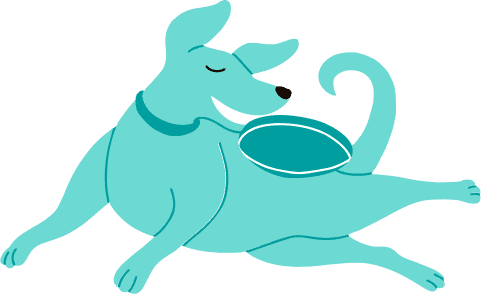
Find Scottish Deerhound puppies near you
Adopting a Scottish Deerhound
We don't see any Scottish Deerhounds available for adoption in your exact location or cities near you, but here are some adorable similar breeds in Beverly Hills, CA.
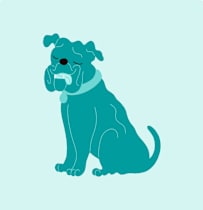
Antonio
Greyhound
Male, 1 yr 6 mos
Los Angeles, CA

Enzo
Greyhound American Bulldog
Male, 2 yrs 2 mos
Santa Monica, CA
Good with dogs
House-trained
Spayed or Neutered
Shots are up-to-date

Lumi
Greyhound Labrador Retriever
Female, young
Los Angeles, CA
Good with dogs
Not good with cats
Needs experienced adopter
House-trained
Spayed or Neutered
Shots are up-to-date

Cher
Greyhound Shar Pei
Female, 1 yr
Inglewood, CA
Good with dogs
Spayed or Neutered
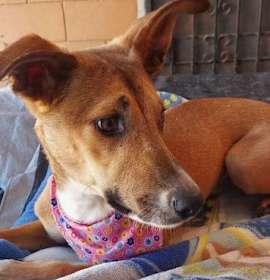
Brawny
Greyhound Labrador Retriever
Female, young
Woodland Hills, CA
Good with dogs
Good with cats
Spayed or Neutered
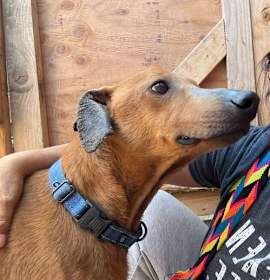
Cunningham
Greyhound Greyhound
Male, adult
Los Angeles, CA
Good with dogs
Spayed or Neutered
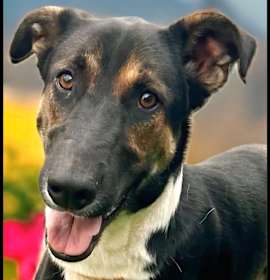
Mista B
Greyhound Shepherd (Unknown Type)
Male, 2 yrs 8 mos
Canoga Park, CA
Good with dogs
House-trained
Spayed or Neutered
Shots are up-to-date

Lisa
Greyhound
Female, adult
Los Angeles, CA
Spayed or Neutered

Antonio
Greyhound
Male, 1 yr 6 mos
Los Angeles, CA

Enzo
Greyhound American Bulldog
Male, 2 yrs 2 mos
Santa Monica, CA
Good with dogs
House-trained
Spayed or Neutered
Shots are up-to-date

Lumi
Greyhound Labrador Retriever
Female, young
Los Angeles, CA
Good with dogs
Not good with cats
Needs experienced adopter
House-trained
Spayed or Neutered
Shots are up-to-date

Cher
Greyhound Shar Pei
Female, 1 yr
Inglewood, CA
Good with dogs
Spayed or Neutered

Brawny
Greyhound Labrador Retriever
Female, young
Woodland Hills, CA
Good with dogs
Good with cats
Spayed or Neutered

Cunningham
Greyhound Greyhound
Male, adult
Los Angeles, CA
Good with dogs
Spayed or Neutered

